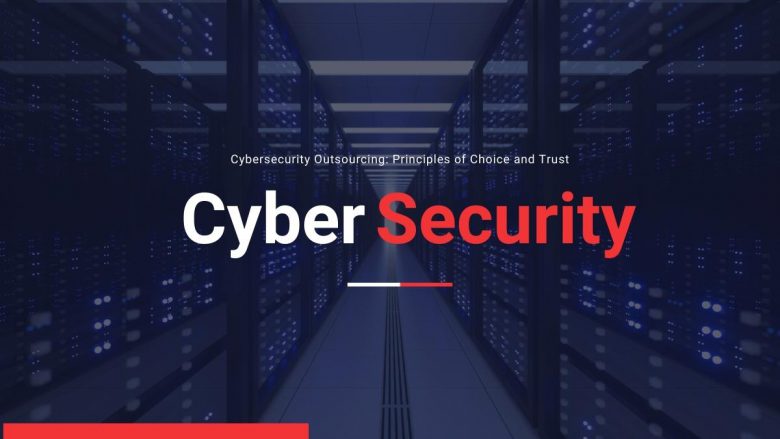
A few years ago, outsourcing in the field of cybersecurity was thought to be artificial and frequently constrained. Outsourcing in the field of cybersecurity still occurs infrequently nowadays. Instead, a lot of businesses choose to handle security matters independently.
Although almost everyone has heard of cybersecurity outsourcing, many businesses still have very varied interpretations of the precise content of this concept.
I wish to address the following significant queries in this article: Outsourcing in cybersecurity has any risks? The service is for whom? What circumstances make outsourcing security beneficial? What distinguishes the MSSP and SecaaS models, in the end?
Why do companies outsource?
There are several reasons why companies outsource. First, it can be cheaper to outsource than to keep the work in-house. Second, companies may not have the necessary skills or resources internally to do the work themselves. Third, outsourcing can help companies focus on their core competencies and avoid being distracted by non-core activities.
Outsourcing can save companies money because they can take advantage of lower labor costs in other countries. In addition, companies can avoid the expense of training and development for employees who will be doing the work. Finally, outsourcing can help companies improve their bottom line by increasing efficiency and reducing waste.
Companies may also outsource because they lack the internal expertise or capacity to do the work themselves. For example, a company may outsource its human resources function to an outside firm that specializes in that area.
Who needs cybersecurity outsourcing?
In the current business climate, it’s more important than ever to have a good cybersecurity infrastructure in place. Unfortunately, many businesses don’t have the internal resources to devote to this critical area. That’s where outsourcing comes in.
Outsourcing cybersecurity can be a great way to ensure that your business has the protection it needs without breaking the bank. There are several companies that specialize in providing cybersecurity services, and they can tailor a package to meet your specific needs.
If you’re worried about the cost of outsourcing, keep in mind that the cost of not outsourcing can be much higher. A data breach can cost a company millions of dollars, and reputational damage can be even more costly. When you compare those risks to the relatively modest cost of outsourcing, it’s clear that cybersecurity outsourcing is a smart investment for any business.
What information security functions are most often outsourced?
Outsourcing has become a popular option for businesses when it comes to information security. There are many benefits to outsourcing, including cost savings and access to experts. However, there are also some risks to consider before outsourcing any information security function.
The most common functions that are outsourced are monitoring and maintenance. This includes tasks such as patch management, intrusion detection, and vulnerability scanning. These functions are typically outsourced to managed service providers or security operations centers.
Outsourcing can be a great way to improve your information security posture. However, it’s important to do your homework and carefully select the right partner. Make sure you understand the risks and benefits of outsourcing before making any decisions.
Outsourcing vs. outstaffing
The outsourcing vs. outstaffing debate has been around for years, with no clear winner. Each option has its own advantages and disadvantages, which must be carefully considered before making a decision.
Outsourcing is the process of hiring a third-party company to handle all or part of your business’s cybersecurity needs. This can be a cost-effective way to get access to experienced professionals and the latest technology. However, it also comes with some risks, such as loss of control over your data and potential security breaches.
Outstaffing is similar to outsourcing, but instead of hiring a third-party company, you bring in individual contractors to work on specific projects. This can give you more flexibility and control over your cybersecurity efforts, but it can also be more expensive.
Managed Security Service Provider (MSSP) or Security-as-a-Service (SECaaS)
As more and more businesses move their operations online, the need for reliable cybersecurity increases. Many companies are turning to managed security service providers (MSSPs) or security-as-a-service (SECaaS) providers to outsource their cybersecurity needs.
MSSPs and SECaaS providers offer a variety of services that can help businesses protect their data and systems from cyberattacks. These services can include 24/7 monitoring, intrusion detection and prevention, malware removal, and more.
Outsourcing your company’s cybersecurity needs to an MSSP or SECaaS provider can help you save time and money while ensuring that your data is well-protected.
How do evaluate the effectiveness of outsourcing?
Organizations increasingly outsource cybersecurity functions, but this can create new risks. How can you evaluate the effectiveness of outsourcing and ensure that your data is safe?
When considering whether to outsource cybersecurity, organizations must carefully weigh the risks and benefits. On the one hand, outsourcing can provide access to skilled resources and state-of-the-art tools. On the other hand, it can create new vulnerabilities if not properly managed.
To evaluate the effectiveness of outsourcing, organizations should consider the following factors:
- The service provider’s security posture. Does the provider have a robust security program in place? Are their systems up to date with the latest security patches?
- The provider’s incident response capabilities. Does the provider have a plan in place for responding to cyber incidents? Have they tested this plan?
- The provider’s policies and procedures.
What functions should not be outsourced?
There are a few key functions that businesses should not outsource to third-party vendors, especially when it comes to cybersecurity. One function that should always remain in-house is your organization’s data backup and disaster recovery plan. This is because you need to have control over your most critical data and be able to access it in the event of an emergency.
Another function that should be kept in-house is your organization’s security monitoring. This includes things like intrusion detection and prevention, as well as keeping an eye on your network for any suspicious activity. You need to be able to trust that your security team is keeping a close watch on things and won’t miss anything important.
Finally, you also need to consider the risks of outsourcing any functions that involve customer data. This includes things like customer service or the billing and invoicing.
Benefits of cybersecurity outsourcing
As the world increasingly moves online, the need for reliable cybersecurity becomes more and more important. For businesses, the cost of hiring an in-house team of experts can be prohibitive. Outsourcing cybersecurity can be a cost-effective way to keep your business safe.
There are many benefits to outsourcing cybersecurity. Perhaps the most important is that it frees up your own staff to focus on their core competencies. It can also be more cost-effective than maintaining an in-house team, as you only pay for the services you use.
When choosing a provider, it’s important to do your research and make sure they have a good reputation. Once you’ve found a provider you trust, you can rest assured that your business is in good hands.
The assessment of service quality
As the world of business changes and grows, so too does the need for increased security. Many companies are now turning to outsourcing their cybersecurity needs to keep up with the demand. This article will assess the quality of service that these outsourced companies provide.
There are many factors to consider when assessing the quality of service of an outsourced company. The first is whether or not they can meet the specific needs of their clients. Each company has different cybersecurity needs, and the outsourced company must be able to tailor its services to meet these needs. The second factor is the experience of the staff. The staff members must have a good understanding of cybersecurity to be able to provide effective services. The third factor is the cost of the services.
What parameters should be included in service level agreements?
When it comes to outsourcing Cybersecurity, service level agreements (SLAs) are key. But what parameters should be included in these SLAs? Here are some important considerations:
First, identify what services are being outsourced and what level of service is expected. This will help set expectations for both parties involved.
Next, consider how response times will be handled in the event of a security breach or incident. This is critical to ensure that the proper response protocol is followed.
Finally, make sure to include provisions for regular review and updates to the agreement. This will help ensure that both parties are always on the same page and that the agreement remains relevant over time.
Prospects for the development of cybersecurity outsourcing in 2023
The future of cybersecurity outsourcing is looking bright. By 2023, the market for outsourced cybersecurity services is expected to grow to $45 billion. This growth will be driven by the continued increase in cyber attacks and the need for organizations to focus on their core businesses.
Outsourcing cybersecurity is a cost-effective way for organizations to protect their data and systems from attack. It also frees up internal resources that can be better used to focus on the organization’s core business.
Several factors will contribute to the growth of cybersecurity outsourcing in 2023. These include the continued increase in cyber attacks, the need for organizations to focus on their core businesses, and the continued advancement of technology.


